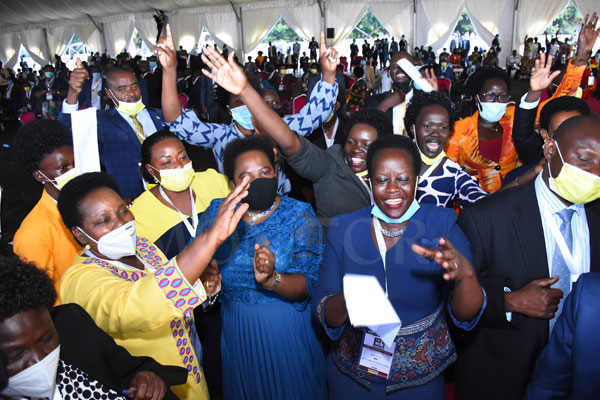Prime
Key Bills, Acts and reports passed in First Session of 11th Parliament

Uganda’s largest Parliament, with 529 MPs, operated under shrunk space and stiff Covid-19 preventive measures. PHOTOS/ FILE
The First Session of the 11th Parliament commenced work soon after the MPs took oath of office in May 2021.
Despite Covid-19 having radically changed the way the House would conduct its business, the First Session of the 11th Parliament set about to execute its core mandate of legislation, representation, budgeting, and oversight.
Below are some of the Bills, Acts and Reports passed during the First Session of 11th Parliament.
NSSF (Amendment) Act, 2021
The passing of the National Social Security Fund (Amendment) Act, 2021, in November was a landmark occasion in the 11th Parliament.
The Bill, assented to by the President on January 4 grants workers mid-term access to their contributions and removes restrictions for voluntary savings.
The NSSF Bill was first passed by the 10th Parliament in February 2021 before it was returned to the House by the President and later re-tabled in the 11th Parliament.
By enacting this law, the legislators have made a big contribution towards improving the livelihood of workers, who had for long advocated access to their savings so that they could invest.
Public Finance Management, Tax Bills
Parliament also passed three Bills intended to facilitate oil and gas activities. They are the Public Finance Management (Amendment) Bill, 2021, and the East African Crude Oil Pipeline (Special Provisions) Bill, 2021.
The Public Finance Management (Amendment) Bill, 2021, is to allow the Uganda National Oil Company (UNOC) to retain a portion of the proceeds from the sale of petroleum products.
Meanwhile, the East African Crude Oil Pipeline (EACOP) (Special Provisions) Bill, 2021, is to boost the full implementation of the oil pipeline project in Uganda.
The law will also define the local content regime applicable to the EACOP and ensure that Ugandan citizens and enterprises benefit from the project. It will also guarantee third-party access to the pipeline and define the tariff to be paid.
Income Tax (Amendment)
(No. 2) Bill, 2021
The Income Tax (Amendment) Bill on the other hand provides for windfall tax and limitations of deductions on petroleum operations.
In conformity with Article 82 of the Constitution, which highlights the mandate of the Speaker and Deputy Speaker of Parliament, MPs passed the Administration of Parliament (Amendment) Bill, 2021, which now includes the Deputy Speaker as a member of the Parliamentary Commission. Previously, the Deputy Speaker was not a member of the Parliamentary Commission.
Covid, Emyooga reports
As part of their oversight role, members carried out various activities that culminated in the adoption of four reports by the House.
The House received, debated and adopted the report of the Parliamentary Task Force on the National Covid-19 Response.
The task force was mandated to inquire into and report on the government’s preparedness and response to Covid-19 and to provide an assessment of the health impact of Covid-19.
Following the report of the task force, the MPs called for a forensic audit into Shs4 trillion that was meant to fight the Covid-19 pandemic since its onset in March 2020, to ascertain value for money.
The House also received various reports arising from the oversight activity on the implementation of the Emyooga programme in the country.
Opposition alternatives
Following reports of irregularities in the implementation of the programme, MPs were tasked to assess the impact of the Emyooga funds in their constituencies prior to the commencement of the much-anticipated Shs490 billion Parish Development Model (PDM).
The MPs faulted government for the systemic failure in the implementation of the Emyooga presidential initiative rolled out in October 2020 and aimed at wealth and job creation.
In their sub-regional reports presented after assessment visits to the constituencies, the MPs discovered that the implementation design of the emyooga initiative was marred by several inconsistencies and mishaps, which frustrated the desired outcome.
In response to the sub-regional reports, the Shadow minister of Finance, Muwanga Kivumbi, advised the government to set up a price stabilisation fund to create buffer stocks that give government a free hand to either introduce stock or buy excess stock from farmers to ensure price stability.
He also called for the re-establishment of the Cooperative Bank, which he said would have the confidence to loan to farmers as opposed to the risk-averse commercial banks that cannot tolerate vulnerabilities in the agriculture sector and other interventions listed in the programme.
PM’s question time, responses
The Prime Minister, in carrying out her role as Leader of Government Business in Parliament, responded to 76 questions from MPs during Prime Minister’s Question Time, especially those concerning government’s response to the Covid-19 pandemic.
One of the core roles of the Opposition in Parliament is to provide alternatives and influence legislation in Parliament. In this regard, the Leader of the Opposition in Parliament (LoP), Mr Mathias Mpuuga, through the Shadow Cabinet, presented six statements to Parliament, which included statements on the state of the education sector; the new Covid-19 variant, Omicron; and the shrinking civic space, among others.
During the First Session, two petitions were also presented in the House, 97 questions were answered by different sector ministers and 49 ministerial statements were made.
Upon resumption of the House, legislators are expected to process the Markets Bill, 2021; the Mineral and Mining Bill, 2021; the Succession (Amendment) Bill, 2021; and the Supplementary Appropriation No.3 Bill, 2021. Others include the Supplementary Appropriation No. 2 Bill, 2021; the re-tabled Landlord and Tenant Bill, 2021; the Physical Planners Registration Bill, 2021; and the Fisheries and Aquaculture Bill, 2021.
Question time
The Prime Minister, in carrying out her role as Leader of Government Business in Parliament, responded to 76 questions from MPs during Prime Minister’s Question Time, especially those concerning government’s response to the Covid-19 pandemic.



